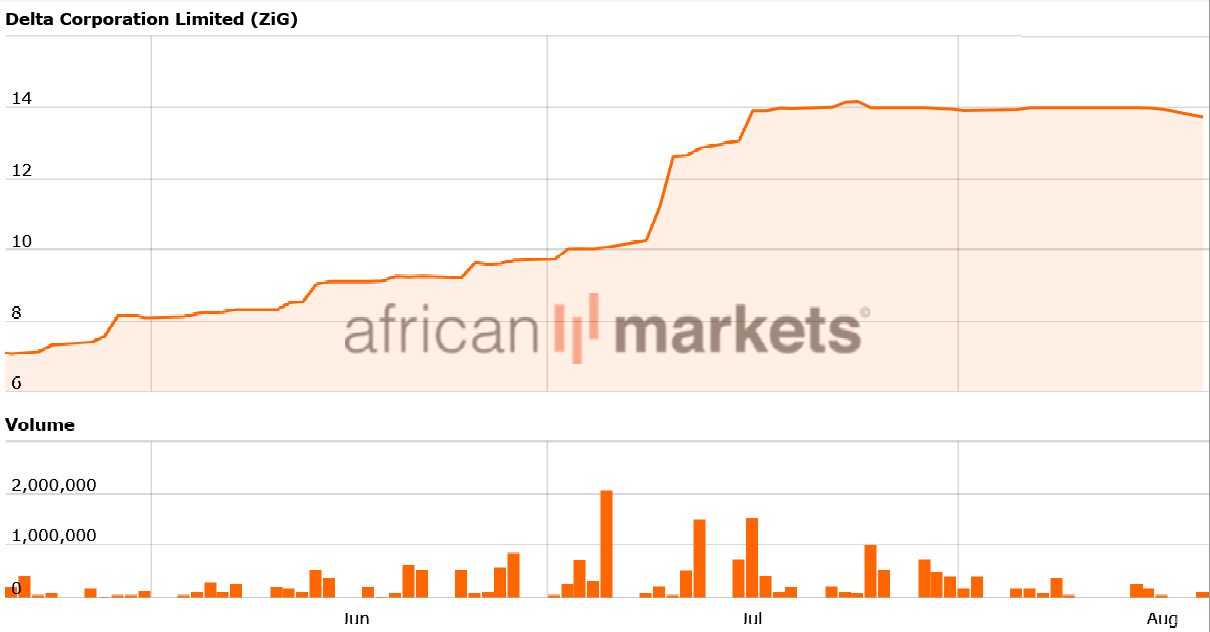Day Trading in Zimbabwe



Zimbabwe’s economy has had to tackle high inflation and local currency depreciation. Yet despite this, day trading activity is growing as broader interest in financial markets picks up, while the central bank has launched a new currency, Zimbabwe Gold (ZiG).
This guide discusses how day trading in Zimbabwe works. It will look at the country’s financial markets, explain how they are regulated, describe the country’s tax regime, and show you how a short-term trade might work.
Quick Introduction
- Day traders in Zimbabwe can trade a wide variety of financial instruments including currencies and stocks. Share trading takes place on the Zimbabwe Stock Exchange (ZSE) and the Victoria Falls Stock Exchange (VFEX).
- The Securities and Exchange Commission of Zimbabwe (SECZ) primarily regulates securities, while the Reserve Bank of Zimbabwe (RBZ) oversees the forex market. The SECZ is as an ‘orange tier’ regulator under DayTrading.com’s Regulation & Trust Rating.
- Retail investors may need to pay income tax of up to 40% on their profits, a 3% AIDS levy, and a withholding tax of 2% on any gains made via stock trading to the Zimbabwe Revenue Authority (ZIMRA).
Top 4 Brokers in Zimbabwe
Following our hands-on tests, these 4 platforms came out on top for day traders in Zimbabwe:
What Is Day Trading?
Day trading is a strategy where an individual buys and sells assets on financial markets all on the same trading day. The aim of this approach is to make a high number of trades throughout the course of the day, often in quick succession, to exploit small price movements.
Day traders can deal in a wide variety of financial securities including stocks, commodities, cryptocurrency and derivatives. Forex trading in Zimbabwe is particularly popular, providing a way for residents to hedge against the country’s economic instability.
However, dealing certain higher-risk assets may be banned or severely restricted in certain territories (such as contracts for difference (CFDs) in the US, and digital currencies in China).
There are no such constraints on these assets in Zimbabwe. In fact, lawmakers in the country are exploring the development of a regulatory framework for digital currency trading. CFD trading in Zimbabwe is also permitted and popular with short-term traders.
Equities trading takes place on two different exchanges: the Zimbabwe Stock Exchange (ZSE), whose operation since 1896 makes it one of Africa’s oldest share-trading venues; and the Victoria Falls Stock Exchange (VFEX).
The VFEX is a subsidiary of the ZSE and was launched in 2020 to facilitate a more stable share trading environment. Securities here are denominated in the US dollar (USD), which protects traders from the volatility that often engulfs Zimbabwe’s local currency.
The lion’s share of local stocks are listed on the ZSE, including clothing retailer Truworths, beer and soft drinks maker Delta Corporation, and financial services provider CBZ.Investors can also deal in exchange-traded funds (ETFs) and real estate investment trusts (REITs) on the ZSE, while CFDs were launched in May 2024 on the VFEX.
In April 2024, the Reserve Bank of Zimbabwe (RBZ) rolled out a new currency known as ‘Zimbabwe Gold,’ or ‘ZiG’ for short. It hopes the new counter – which is backed by the central bank’s gold and forex reserves – will boost economic growth and solve the country’s stratospheric inflation.
Is Day Trading Legal In Zimbabwe?
Yes. Active trading is largely regulated by the Securities and Exchange Commission of Zimbabwe (SECZ), which exists to promote the functionality, integrity and transparency of financial markets, and to ensure that investors are well protected.
The SECZ’s main tasks, in its own words, are:
- To regulate trading and dealing in securities.
- To register, supervise and regulate securities exchanges.
- To license, supervise and regulate licensed persons.
- To encourage the development of free, fair and orderly capital and securities markets in Zimbabwe.
- To advise the Government of Zimbabwe on all matters relating to securities and capital markets.
- To promote investor education.
Regulation of the country’s forex market falls under the purview of the RBZ. Its functions include setting official exchange rates and managing foreign currency auctions, along with licensing, overseeing and controlling the activities of authorized dealers like banks and bureaux de change.
How Is Day Trading Taxed In Zimbabwe?
Active traders must declare the profits they make to the Zimbabwe Revenue Authority (ZIMRA).
They are typically subject to income tax, the brackets and tax-free thresholds which have changed following the introduction of the ZiG in spring 2024.
The rate of income tax works on a progressive scale up to a maximum of 40% of earnings. See more details.
On top of this, share traders on the ZSE must pay a 2% withholding tax on any capital gains they make between 28 June and 28 December. As the name suggests, this tax is applied at source.
Day traders must also pay the AIDS levy, which is imposed at 3%.
Getting Started
There are three tasks you’ll need to complete to begin day trading in Zimbabwe:
- Locate a broker. Consider a variety of factors, including the quality of the brokerage’s trading platform, the amount of leverage on offer, the range of tradeable financial securities, and deal execution speeds. The number one thing on your checklist should be to ensure that the company is licensed to trade in Zimbabwe and/or a well-regulated overseas region, such as the UK’s FCA, Hong Kong’s SFC, or the SEC of the US.
- Open an account. The next stage may only take a few minutes, and will require you to supply some personal information alongside proof of address and identification. In our experience, you’ll also normally need to answer some questions covering issues like my trading objectives and attitude to risks. Be aware that certain brokers may have different verification processes and requirements.
- Deposit some cash. You may be able to familiarize yourself with the broker’s platform by first opening a demo account, if available. When you’re ready to start real-world trading, however, you’ll need to send some Zimbabwean or US dollars, for example, over to your deposit account. You can usually do this by making a debit card payment or executing a wire transfer. You may also be able to use the services of an online payment provider such as local operator Vpayments.
A Day Trade In Action
With these steps completed, you’ll be ready to start actively dealing in Zimbabwe’s financial markets. Here’s a theoretical example of what a short-term trade on the ZSE could look like.
The Background
My plan is to buy shares in drinks manufacturer Delta Corporation before the RBZ makes its next interest rate announcement. This can be released at any time between 09:00 and 14:00 local time (Central Africa Time, or CAT).
After researching Zimbabwe’s economic landscape, I conclude that the central bank is likely to reduce interest rates by 25 basis points, to 19.5%. By contrast, the broader market has priced in the likelihood that lending rates will remain locked at 19.75%.
If I’m correct, Delta’s share price could rise. This is because the Castle Lager manufacturer – which sources the lion’s share of its revenues from Zimbabwe – may benefit from the consumer spending boost that lower rates would provide.
Before placing my trade, I also carry out some technical analysis to get a better idea of where Delta Corporation shares could move after the central bank’s announcement.
The success of short-term trading strategies (like day trading) is greatly dependent on understanding what’s on the charts.
The Trade
Having finished my research, I sit down at my trading platform at 8.50 CAT and prepare to punch in my trade. I give myself a good 10 minutes to complete the process before the RBZ potentially announces its latest decision.
Executing my long position involves two steps:
- Inputting a ‘take profit’ order, which automatically closes my trade if prices appreciate to a level I’ve selected; and
- Creating a ‘stop loss’ instruction, which also exits my position if prices drop to a level of my choosing.
These orders help me manage risk by either locking in my profits or limiting my losses.

At this time, I discover that Delta shares are changing hands at 13.363205 ZiG apiece. So I place my ‘take profit’ and ‘stop loss’ instructions at 13.463515 ZiG and 13.323176 ZiG respectively.
A couple of hours later, at 10:43 CAT, the central bank announces that it’s reduced interest rates to 19.5%, as I’d predicted.
By mid-afternoon, Delta Corporation’s share price has risen to my ‘take profit’ level of 13.463515 ZiG, closing my position and providing me with a profit of 0.10031 ZiG for each share I bought.
Bottom Line
As in many emerging regions, fraud can be a problem in Zimbabwe’s financial markets. In this case, ongoing economic instability and a looser regulatory environment versus most mature markets means that short-term traders need to be extra vigilant to avoid scams.
Having said that, the development of Zimbabwe’s financial markets and the broader economy continues at pace, and this is helping day trading to steadily grow.
Investors should ensure that the broker they choose is approved to deal by regulators in the country, or in a tightly regulated foreign territory, in order to protect themselves.
To get started, see DayTrading.com’s pick of the best day trading platforms.
Recommended Reading
Article Sources
- The World Bank in Zimbabwe – World Bank
- Zimbabwe Government Launches Study on Cryptocurrency Landscape – The Zimbabwe Mail
- Zimbabwe Seeks Input to Regulate Cryptocurrency Operations - Bloomberg
- Zimbabwe Stock Exchange (ZSE)
- Victoria Falls Stock Exchange (VFEX)
- About Us - VFEX
- Launch of Contract For Differences (CFDs) on the Victoria Falls Stock Exchange – African Markets
- Zimbabwe launches new gold-backed currency – ZiG – BBC News
- Securities and Exchange Commission of Zimbabwe (SECZ)
- Reserve Bank of Zimbabwe (RBZ)
- Statutory Instrument 74 of 2024 - Zimbabwe Legal Resources Website
- Statutory Instrument 110 of 2024: Finance (Amendment of Sections 38 and 39 Finance Act) Regulations, 2024 - ZSE
- Individual - Taxes on personal income - PwC
The writing and editorial team at DayTrading.com use credible sources to support their work. These include government agencies, white papers, research institutes, and engagement with industry professionals. Content is written free from bias and is fact-checked where appropriate. Learn more about why you can trust DayTrading.com



